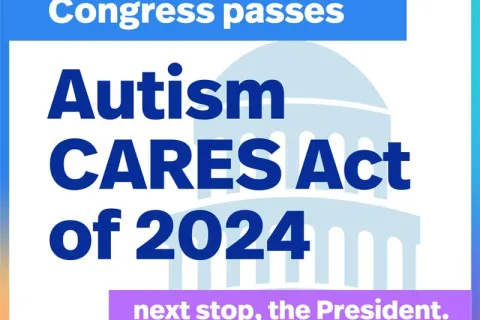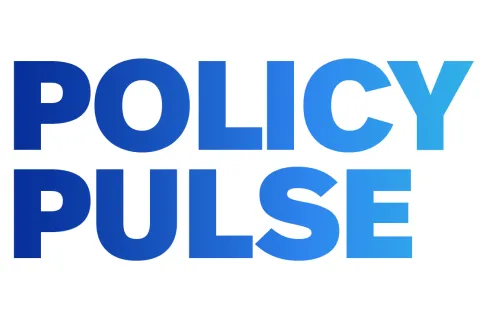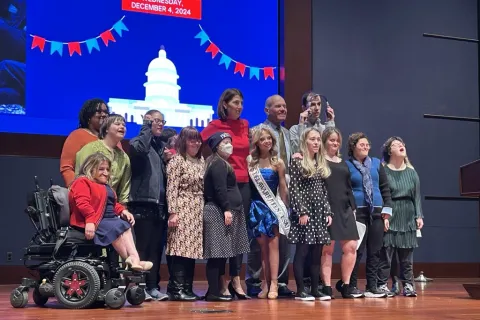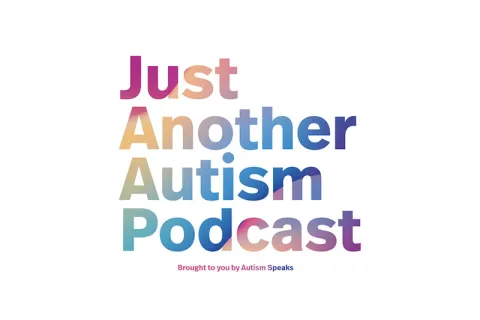2022 Advocacy Highlights
December 31, 2022From Washington, D.C. to state capitals, together with advocates across the country, our team works to protect the rights of autistic individuals and advocate for investments in autism programs that pay dividends for our community. Throughout this year, we pursued policy solutions that ensure billions of dollars are dedicated at the federal and state levels to improving and expanding the services, supports and opportunities available to autistic people.
Today, we celebrate the policy milestones and accomplishments that your support helped us achieve in 2022.
- $5 million increase for the Autism and Developmental Disabilities Monitoring Network (first increase in 10 years!)
- Continued push by Congress to get the National Institutes of Health (NIH) to invest more in autism research
- $30 million in funding for the Autism Research Program at the Department of Defense
- Texas became the 50th state to require coverage of applied behavior analysis therapy for autistic children enrolled in Medicaid, while states across the country took steps to improve the implementation of coverage for autism services under Medicaid and state-regulated insurance plans
- Kevin and Avonte’s Law reauthorized
- Autism Family Caregivers Act introduced in Congress
- Florida and New York took significant steps to improve student outcomes and well-being by expanding access to or investing in special education programs.
Read on for more highlights from 2022…
Funding advancements in autism research and services
Autism Speaks consistently and forcefully advocates for Congress to provide robust resources for autism research and services through a number of federal programs in its annual budget process. The Consolidated Appropriations Act of 2023 marked a milestone in advancing not only autism research programs but additional government initiatives that benefit people with autism. It included a significant increase in autism research funding in the FY23 federal budget, a priority issue for which 79 members of the House of Representatives and 19 U.S. Senators had signed letters to congressional leaders in support. The most notable wins include:
- $5 million increase to expand autism-related activities at the Centers for Disease Control and Prevention (CDC) – the first increase in CDC funding for autism-related activities in 10 years
- A call on the NIH to invest part of its overall $2.5 billion funding increase to advance research on racial, ethnic and socioeconomic health disparities within the autism community, and to boost access to services across the lifespan and implementation-focused research that targets caregiver-mediated interventions, including caregiver skills training
- A new provision calling on the NIH to prospectively indicate how they are working to invest in autism research in the coming year
- Support for the National Institute of Aging’s ongoing work related to autism and aging
- $2 million increase for HRSA’s autism and developmental disorder activities, including the LEND Program
As Congress passed both fiscal year 2022 and 2023 spending bills in calendar year 2022, Autism Speaks advocated for additional key priorities that passed in both (numbers reflect total for both bills):
- $30 million for the Autism Research Program at the Department of Defense
- $6 million for Kevin and Avonte’s Law, which funds safety and wandering prevention programs
Securing insurance coverage for autism therapies
Autism Speaks works in states across the country to improve public and private health insurance coverage of medically necessary care for people with autism.
- Texas became the 50th state to implement its Medicaid autism services benefit which provides coverage for applied behavior analysis (ABA) therapy when medically appropriate for autistic children and young adults enrolled in Medicaid.
- Oklahoma will require state-regulated small group and individual health insurance plans to provide meaningful coverage of autism services beginning in 2023 thanks to the passage of a new law focused on enforcing its state autism insurance law and expanding the types of health plans that have its protections.
- Iowa and Virginia boosted mental health parity protections and accessibility of therapy for individuals with autism by amending the definitions of autism and medical necessity in their autism insurance laws.
- Illinois enacted two laws to address provider network adequacy issues that limit access to ABA therapy. A Medicaid reporting law will require an annual provider network adequacy report by the Department of Healthcare and Family Services, and a new ABA licensure law removed a layer of bureaucracy within Medicaid that should help increase the ABA provider network serving autistic children.
- Georgia’s Mental Health Parity Act was signed into law, boosting protections for autistic individuals and improving coverage of autism services by Medicaid, the State Health Benefit Plan and other state-regulated health plans. It approved $200 million in new money for the state’s Department of Behavioral Health and Developmental Disabilities, requires publicly funded insurance programs to spend more on patient care and authorizes loan forgiveness for people studying to become mental health professionals.
- Florida developed a new web page about autism-related insurance benefits for Florida consumers.
- New York enacted a law that will bring the state’s licensure requirements for applied behavior analysts into alignment with the criteria set by the Behavior Analyst Certification Board. This law will ensure that new ABA graduates can continue their pathway to full licensure and will help increase the pool of ABA professionals providing services to people with autism. New York also enacted legislation that formally added ABA as a state Medicaid benefit, which reflects current practice.
Expanding access to healthcare services
Through our support of the HEADs UP Act, we led efforts to achieve better health outcomes for the entire developmental disability population. This bill would improve access to behavioral, medical and dental care for people with intellectual and developmental disabilities, including autism, by designating this group as a Medically Underserved Population.
We provided input and support for the Mental Health Reform Authorization Act of 2022, which was introduced with bipartisan support. This legislation enhances a number of federal mental health programs and includes important new provisions to address gaps in mental health parity. These along with some of the bill’s other provisions were passed through the Consolidated Appropriations Act of 2023.
We supported efforts to reinstate a ban on the use of electrical stimulation devices (ESDs) on children and adults with self-injurious or aggressive behaviors. The Consolidated Appropriations Act of 2023 included language that should allow the FDA to move forward with regulations to ban the use of ESD’s for self-injurious or harmful behavior.
Ohio rolled out their new specialized managed care program, OhioRISE (Resilience through Integrated Systems and Excellence), which provides specialized services and coordinated care for children with behavioral health needs. We provided a webinar to help our community learn about the implications of this new program for some children with autism.
Following Autism Speaks input, Iowa updated its regulations regarding registered behavior technicians (RBTs), with the goal of increasing the qualified applicant pool of those who can assist with providing ABA services.
Improving transition planning and special education
The Consolidated Appropriations Act of 2023 included a $904 million increase for the Individuals with Disabilities Education Act (IDEA), which includes funding for IDEA Part B grants to states, and an increase of $20 million for special education personnel preparation.
To ensure a smooth transition into adulthood, our advocacy emphasizes the importance of early planning and empowering families with knowledge about post-high school programs and services. This year, we continued advocating to lower the required age to begin transition planning in California. The process to make changes in the state’s IEP (individualized education plan) system, transition planning and alternative diplomas will continue in 2023 with two legislatively funded work groups.
Florida improved student outcomes by increasing access to in-school behavioral therapy and expanded access to special education programs. One new law allows behavior technicians to be included in the list of medical providers with access to serve patients while they are in school. Another law extends the upper age limit for the identification of a student as having a developmental delay, allowing for later age eligibility for public special education programs.
New York included additional funding to address student well-being and learning loss in response to COVID-19, including support for extended school day or school year programs, afterschool programs, mental health professionals and other locally determined initiatives. The state budget included $240 million in new funds for approved special education schools and $100 million of matching funds over two years for school districts and BOCES (a public educational support entity).
Enhancing lifespan supports
Kevin & Avonte’s Law was reauthorized. Since its initial passage, this law has appropriated $10 million to law enforcement agencies and community organizations across the country to promote efforts to prevent and respond to children with autism or other developmental disabilities who may wander away from safety. $3 million was dedicated in the FY23 federal budget to fund these grants.
The Autism Family Caregivers Act was introduced in Congress. We worked closely with congressional champions on the development and introduction of this bill. Inspired by caregiver skills training initiatives, like those that Autism Speaks has collaborated on and led domestically and internationally, this bill would authorize $50 million in grants to establish 25 pilot sites in at least 15 states to provide skills training to caregivers of children with autism and other developmental disabilities or delays. This training would provide caregivers in underserved communities with evidence-based strategies for using everyday routines and home activities to improve children’s social communication, behavioral outcomes, and physical and mental well-being.
The ABLE Age Adjustment Act passed, raising the age threshold for onset of a disability needed for accessing a tax-favored ABLE account from 26 years of age to 46. This change allows more adults with disabilities to open ABLE accounts to save for long-term care without losing federal benefits.
The Money Follows the Person program was extended for five years. This Medicaid program provides states funding to enhance access to home and community-based services (HCBS) and give people needing long-term support services more choice about where they live and receive care.
Maryland enacted the End the Wait Act to reduce the waitlist for the state’s Autism Medicaid Waiver by 50% by fiscal year 2024. With a current waiting list of 8 or 9 years, this law will expand access to a wide array of supports - like day programs and residential services.
Elevating the Voices of Advocates Across the Country
Crucial to each of these policy milestones and initiatives were the stories shared by autism community members on how additional research funding, improved access to services and additional support will impact their lives.
190 advocates from 30 states and D.C. participated in our virtual 2022 Advocacy Forum & Hill Day in March. They collectively met with over 153 congressional offices sharing perspectives from diverse communities, stories of every-day autism experiences and the positive impact that members of Congress have by supporting our policy requests for support of the Autism Family Caregivers Act and additional federal funding for autism research and services.
425 Volunteer Advocacy Ambassadors from 47 states and the District of Columbia led their communities in advocating year-round to their federal legislators through monthly communications and over 450 in-person and virtual meetings with members of Congress and/or their staff.







